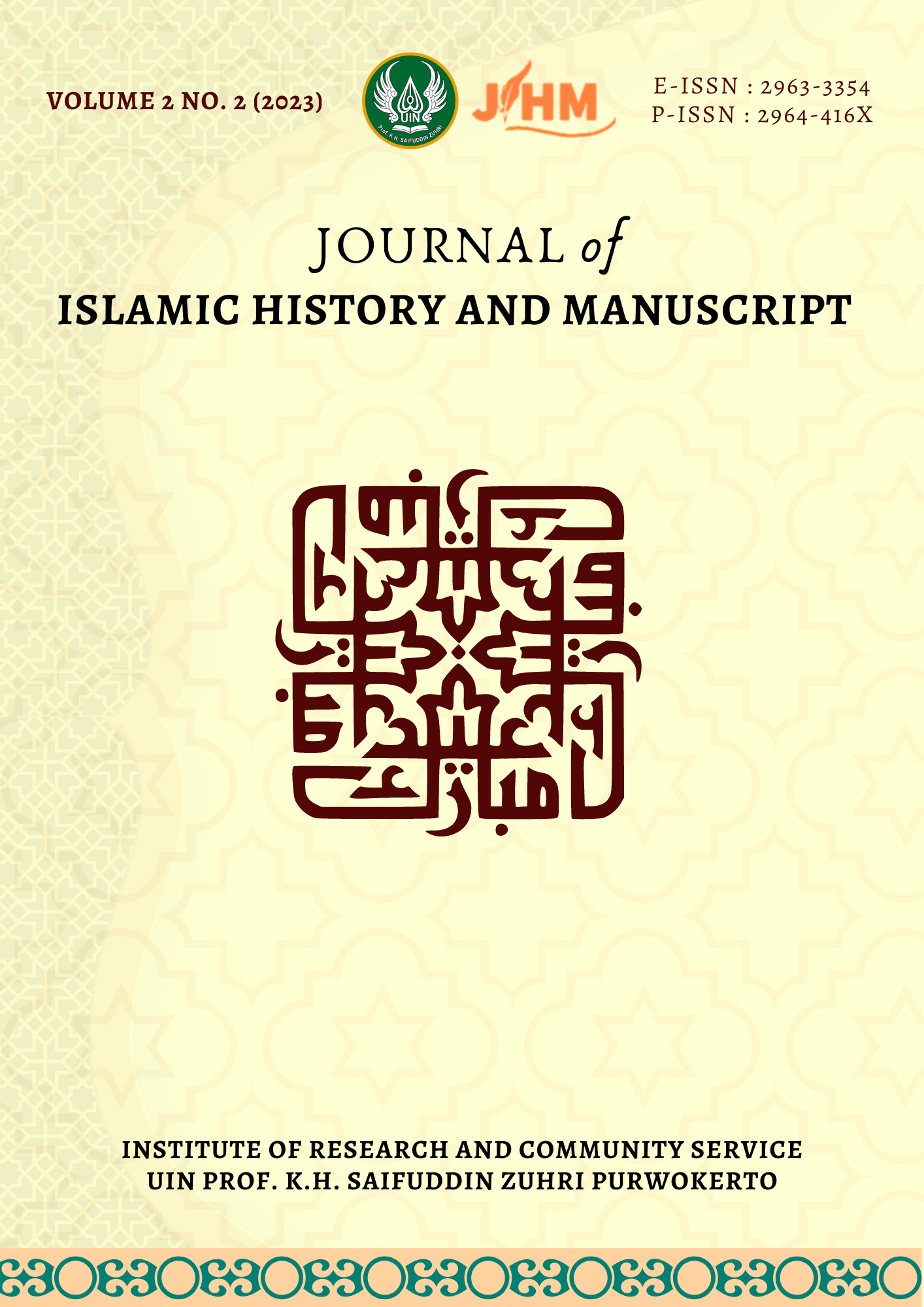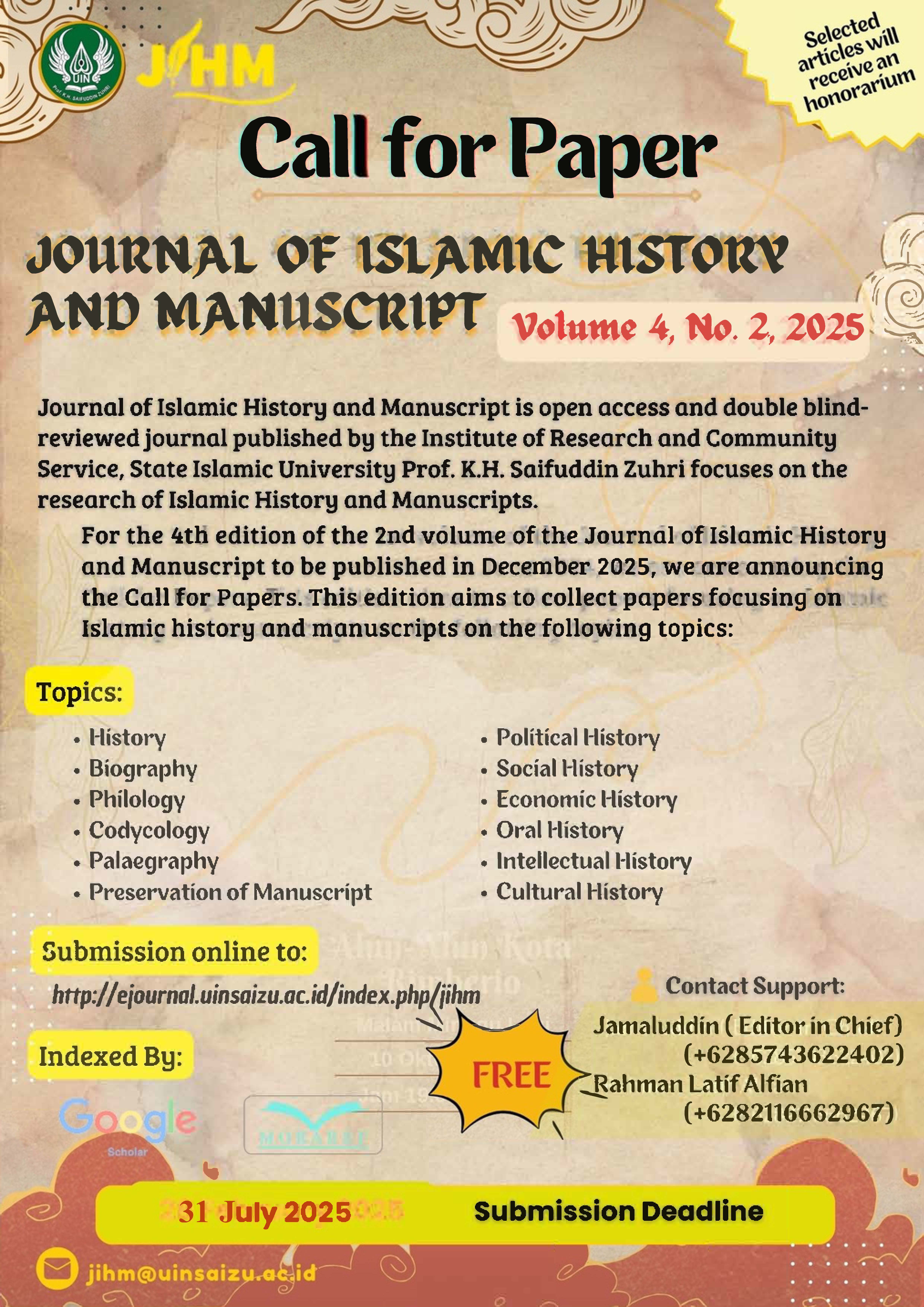Rethinking The Religious Moderation through Intellectual History’s Lens: Mentifact, Sociofact, and Artefact
DOI:
https://doi.org/10.24090/jihm.v2i2.7814Keywords:
Artefact, Intellectual History, Mentifact, Religious Moderation, SociofactAbstract
It must be admitted that there is indeed much research related to religious moderation, but there needs to be more research, especially when it comes to intellectual history discourse. As a contextual discourse, intellectual history still needs sufficient study space among Indonesian academics. Therefore, this study uses an intellectual history perspective to examine religious moderation discourse. Strengthening the study, the authors use the thoughts of Koentjaraningrat and Julian Huxley, who use an anthropological scientific lens to view the discourse of religious moderation. This research is the form of a literature review using the results of research related to intellectual history and the two figures as primary reference sources. Collecting data was carried out by re-reading the text, compiling it, and formulating it to analyze the mentifact, sociofact, and artefact aspects of the discourse of religious moderation. This research produces an academic offer to strengthen the epistemological structure of the discourse of religious moderation by dissecting it through these three dimensions, namely mentifact, sociofact, and artefact. The findings of this research offer the hierarchical relationship on the epistemological of religious moderation (the high ideas, the intermediate ideas, and the lower ideas).References
Adams, I. (1957). Societies around the World. JSTOR.
Afandi, A. J. (2018). Tinjauan Hermeneutika Atas Konsep Ketuhanan Ibn Thuffail. Al-Mada: Jurnal Agama, Sosial, Dan Budaya, 1(1), 1–18.
Ahimsa-Putra, H. S. (2019). Koentjaraningrat dan Integrasi Nasional Indonesia: Sebuah Telaah Kritis. Patra Widya: Seri Penerbitan Penelitian Sejarah Dan Budaya., 20(2), 115–130.
Akmaliah, W. (2020). The demise of moderate Islam: New media, contestation, and reclaiming religious authorities. Indonesian Journal of Islam and Muslim Societies, 10(1).
Alama, M. (2020). A Collaborative Action in the Implementation of Moderate Islamic Education to Counter Radicalism. International Journal of Innovation, Creativity, and Change, 11(7), 497–516.
Alatas, S. F. (2017). Max Weber (1864–1920). In Sociological Theory Beyond the Canon (pp. 113–142). Springer.
Ardi, M. N., Abdullah, F., & Cholil, A. A. (2019). Ukhuwwah al-Islamiyyah as the Basic Foundation of Islamic Moderation: Study of Abdullah bin Nuh’s Works. Jurnal Sains Insani, 4(2), 57–64.
Arif, M. K. (2020). Moderasi Islam (Wasathiyah Islam) Perspektif Al-Qur’an, As-Sunnah serta Pandangan Para Ulama dan Fuqaha. Al-Risalah, 11(1), 22–43.
Arifianto, A. R. (2019). Islamic campus preaching organizations in Indonesia: Promoters of moderation or radicalism? Asian Security, 15(3), 323–342.
Brett, A. (2002). What is intellectual history now? What Is History Now?, 113–131.
Bruhns, H. (2019). Max Weber’s Analysis of Capitalism. In The Oxford Handbook of Max Weber.
Faiqah, N., & Pransiska, T. (2018). Radikalisme Islam Vs Moderasi Islam: Upaya Membangun Wajah Islam Indonesia Yang Damai. Al-Fikra: Jurnal Ilmiah Keislaman, 17(1), 33–60.
Fischer-Kowalski, M. (1998). Society’s metabolism: The intellectual history of materials flow analysis, Part I, 1860–1970. Journal of Industrial Ecology, 2(1), 61–78.
Gilbert, F. (1971). Intellectual history: Its aims and methods. Daedalus, 80–97.
Harlan, D. (1989). Intellectual history and the return of literature. The American Historical Review, 94(3), 581–609.
Huxley, J. (1942). Evolution. The modern synthesis. Evolution. The Modern Synthesis.
Irham, I., Haq, S. Z., & Basith, Y. (2020). Deradicalising religious education: Teacher, curriculum and multiculturalism. Epistemé: Jurnal Pengembangan Ilmu Keislaman, 15(1), 39–54.
Iswanto, A. (2013). Sejarah intelektual ulama Nusantara: Reformulasi tradisi di tengah perubahan. Jurnal Lektur Keagamaan, 11(2), 455–472.
Kamali, M. H. (2015). The middle path of moderation in Islam: The Qur’anic principle of wasatiyyah. Oxford University Press.
Kelley, D. R. (2002). Intellectual history and cultural history: The inside and the outside. History of the Human Sciences, 15(2), 1–19.
Khan, M. M. (2005). Islamic democracy and moderate Muslims: The straight path runs through the middle. American Journal of Islamic Social Sciences, 22(3), 39.
Koentjaraningrat. (1957). A preliminary description of the Javanese kinship system. Yale University, Southeast Asia Studies.
Koentjaraningrat. (1975). Introduction to the Peoples and Cultures of Indonesia and Malaysia. Menlo Park, Calif.: Cummings Publishing Company.
Koentjaraningrat, K. (2014). Antropologi hukum. Antropologi Indonesia.
LaCapra, D. (1980). Rethinking intellectual history and reading texts. History and Theory, 19(3), 245–276.
LaCapra, D. (1992). Intellectual history and its ways. The American Historical Review, 97(2), 425–439.
Lane, M. B. (2005). Public participation in planning: An intellectual history. Australian Geographer, 36(3), 283–299.
Mandelbaum, M. (1965). The history of ideas, intellectual history, and the history of philosophy. History and Theory, 5, 33–66.
Marzali, A. (2014). Pergeseran Orientasi Nilai Kultural dan Keagamaan di Indonesia (Sebuah Esai dalam Rangka Mengenang Almarhum Prof. Koentjaraningrat). Antropologi Indonesia.
Nystrand, M., Greene, S., & Wiemelt, J. (1993). Where did composition studies come from? An intellectual history. Written Communication, 10(3), 267–333.
Ringer, F. (1990). The intellectual field, intellectual history, and the sociology of knowledge. Theory and Society, 269–294.
Rofiq, A. C., Mujahidin, A., Choiri, M. M., & Wakhid, A. A. (2019). The Moderation of Islam In The Modern Islamic Boarding School of Gontor. Analisis: Jurnal Studi Keislaman, 19(2), 1–24.
Ropi, I. (2019). Whither Religious Moderation? The State and Management of Religious Affairs in Contemporary Indonesia. Studia Islamika, 26(3), 597–602.
Thoriquttyas, T., & Hanun, F. (2020). Amplifying the Religious Moderation from Pesantren: A Sketch of Pesantren’s Experience in Kediri, East Java. Analisa: Journal of Social Science and Religion, 5(02), 221–234.
Thoriquttyas, T., Saputra, M., Hanafi, Y., & Huda, I. (2020). The Idea of Religious Moderation from Arabian Classical Literature: Ibn Tufayl’s (1110–1185 CE) Hayy ibn Yaqzan. ISLLCE 2019: Proceedings of the First International Seminar on Languare, Literature, Culture and Education, ISLLCE, 15-16 November 2019, Kendari, Indonesia, 6.
Thoriquttyas, T., Saputra, M., Huda, I., Hanafi, Y., & Zaimatus, N. (2020). Strengthening the Religious Moderation through Innovation of Islamic Religious Education (IRE) based Civic Intelligence and the Values Clarification Technique (VCT). KnE Social Sciences, 219–227.
Viner, J. (1960). The intellectual history of laissez faire. The Journal of Law and Economics, 3, 45–69.
Wahyudi, C. (2011). Tipologi Islam Moderat Dan Puritan: Pemikiran Khaled M. Abou El-Fadl. Teosofi: Jurnal Tasawuf Dan Pemikiran Islam, 1(1), 75–92.
Wickberg, D. (2001). Intellectual history vs. The social history of intellectuals. Rethinking History, 5(3), 383–395.
Wrage, E. J. (1947). Public address: A study in social and intellectual history. Quarterly Journal of Speech, 33(4), 451–457.
Wuryani, E., & Purwiyastuti, W. (2012). Sejarah Intelektual. Widya Sari Press Salatiga.
Yaakub, M. B. B. H., & Othman, K. B. (2017). A conceptual analysis of wasatiyyah (Islamic moderation-IM) from Islamic knowledge management (IKM) perspective. Revelation and Science, 7(1).
Downloads
Published
How to Cite
Issue
Section
License
Copyright (c) 2023 Titis Thoriquttyas, Ahmad Munjin Nasih, Achmad Sultoni

This work is licensed under a Creative Commons Attribution 4.0 International License.
Authors who publish in this journal agree to the following terms:
- Authors retain copyright and grant the journal right of first publication with the work simultaneously licensed under a Creative Commons Attribution 4.0 International License. that allows others to share the work with an acknowledgment of the work's authorship and initial publication in this journal.
- Authors can enter into separate, additional contractual arrangements for the non-exclusive distribution of the journal's published version of the work (e.g., post it to an institutional repository or publish it in a book), with an acknowledgment of its initial publication in this journal.
- Authors are permitted and encouraged to post their work online (e.g., in institutional repositories or on their website) before and during the submission process, as it can lead to productive exchanges and earlier and greater citation of published work (See The Effect of Open Access).

















